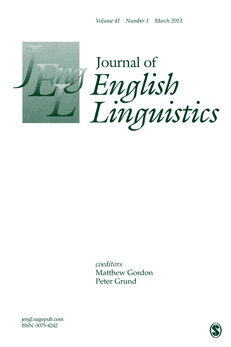
JOURNAL OF ENGLISH LINGUISTICS
Scope & Guideline
Unraveling the Complexities of English Language Evolution
Introduction
Aims and Scopes
- Sociolinguistic Variation and Identity:
The journal frequently explores how sociolinguistic factors such as race, class, and regional identity shape language use and variation within English-speaking communities. - Historical Linguistics and Language Change:
A significant focus is placed on the diachronic study of English, examining how the language has evolved over time and the mechanisms driving these changes. - World Englishes and Contact Linguistics:
The journal addresses the dynamics of English as it interacts with other languages and cultures, particularly in postcolonial contexts, showcasing the emergence of new varieties. - Pragmatics and Discourse Analysis:
Research often delves into pragmatic aspects of English, analyzing how meaning is constructed in context and the role of discourse markers in communication. - Cognitive and Experimental Linguistics:
The journal includes studies that investigate cognitive processes underlying language use, often employing experimental methodologies to understand linguistic phenomena. - Language and Power Dynamics:
Themes of power, identity, and linguistic justice are explored, particularly in relation to marginalized communities and the socio-political implications of language use.
Trending and Emerging
- Sociophonetics and Identity:
Recent publications have increasingly focused on sociophonetic properties of English, particularly how they intersect with issues of race, identity, and community, highlighting the importance of accent and variation. - Language and Social Justice:
There is a growing emphasis on linguistic justice, exploring how language intersects with issues of race, identity, and power dynamics, particularly in marginalized communities. - Impact of Political Ideology on Language Use:
Studies examining the effects of political ideology on language variation and change have gained traction, reflecting broader societal concerns and the role of language in political discourse. - Pragmatic Variation in Different Contexts:
Research exploring pragmatic aspects of language, including discourse analysis and the role of context in meaning-making, has become increasingly prominent. - The Evolution of World Englishes:
The journal is seeing a rise in articles discussing the emergence and characteristics of new varieties of English globally, emphasizing the impact of globalization and cultural exchange on language.
Declining or Waning
- Traditional Grammatical Studies:
There appears to be a marked reduction in papers focusing solely on traditional grammatical analyses devoid of sociolinguistic or contextual considerations, indicating a shift towards more integrated approaches. - Narrowly Defined Dialect Studies:
Research specifically centered on narrowly defined regional dialects without broader implications or connections to sociolinguistic trends is becoming less frequent. - Historical Linguistics in Isolation:
While historical linguistics remains a key area, studies that do not connect historical changes to contemporary sociolinguistic contexts are appearing less often. - Descriptive Analyses without Sociocultural Contexts:
There is a noticeable decline in purely descriptive studies that fail to engage with the sociocultural implications of language use, suggesting a move towards more applied linguistic research. - Linguistic Theory without Empirical Data:
Papers relying heavily on theoretical frameworks without substantial empirical backing or data analysis are becoming less common, reflecting a trend towards data-driven research.
Similar Journals
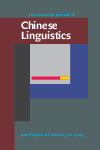
International Journal of Chinese Linguistics
Illuminating the Intersection of Language and CultureInternational Journal of Chinese Linguistics is a distinguished publication that delves into various aspects of linguistic studies pertaining to the Chinese language. Published by John Benjamins Publishing Co, this journal stands out for its commitment to advancing the knowledge and understanding of Chinese linguistics within the global academic community. With an impact factor that places it in the Q2 quartile of linguistics and language, the journal is indexed in prominent databases, achieving ranks of #501 in Arts and Humanities and #580 in Social Sciences. These rankings reflect the journal's dedication to maintaining high scholarly standards and its relevance in both linguistic research and practical applications. While not categorized as Open Access, the journal provides necessary access through institutional subscriptions, thereby ensuring that valuable research reaches a broad audience. Covering a wide range of topics from syntax and phonetics to sociolinguistics and applied linguistics, the International Journal of Chinese Linguistics serves as an essential resource for researchers, professionals, and students seeking to deepen their understanding of the intricate relationship between language and culture in the Chinese context. With converging years from 2019 to 2024, it continues to evolve, reflecting ongoing developments in the field.

REVUE DE LINGUISTIQUE ROMANE
Charting the Evolution of Romance LinguisticsREVUE DE LINGUISTIQUE ROMANE, published by the esteemed SOCIÉTÉ LINGUISTIQUE ROMANE, is a prominent academic journal dedicated to the exploration of Romance linguistics. With its ISSN 0035-1458, the journal plays a significant role in advancing knowledge within the fields of linguistics and the history and philosophy of science. Although it does not currently offer Open Access, it provides critical insights and peer-reviewed research that are indispensable for scholars, educators, and students interested in the nuances of Romance languages. The journal, which has seen converged coverage from 2006 to 2017, and then again from 2019 to 2021, is ranked in the third quartile (Q3) across various categories within Scopus, reflecting its established presence in the academic community. As a vital resource for interdisciplinary studies, REVUE DE LINGUISTIQUE ROMANE is instrumental for those seeking to deepen their understanding of linguistic structures, cultural nuances, and the historical development of Romance languages.

Slovo a Slovesnost
Exploring the Depths of Linguistic InsightSlovo a Slovesnost is a prominent academic journal dedicated to the field of linguistics and language studies, published by the Czech Language Institute of the Czech Academy of Sciences. With an ISSN of 0037-7031, the journal has established itself as a significant resource for researchers and professionals within the linguistic community. Its rigorous selection process and impactful contributions have earned it a commendable Q2 ranking in Linguistics and Language as of 2023, as well as Scopus rankings in the 58th percentile for Language and Linguistics. Offering insights into both theoretical and applied linguistics, Slovo a Slovesnost serves as an essential platform for cutting-edge research, fostering dialogue among scholars, and enriching the study of language within the Czech Republic and beyond. Although it does not provide open access, the journal supports a subscription model that ensures high-quality dissemination of knowledge to a dedicated audience of linguists, educators, and linguistic scholars. With coverage converging from 2004 to 2024, it continues to thrive as a vital corner of linguistic scholarship.
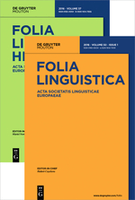
FOLIA LINGUISTICA
Advancing Linguistic Knowledge Since 1967FOLIA LINGUISTICA, published by WALTER DE GRUYTER GMBH, is a premier scholarly journal dedicated to the field of linguistics. Established in 1967, the journal has consistently provided a platform for innovative research and scholarly discourse in language and linguistics, contributing significantly to the academic community's understanding of language structures, usage, and cognitive processes. With its classification in the top quartile (Q1) of linguistics and language in 2023, FOLIA LINGUISTICA holds a respectable rank (#282/1088) within the Arts and Humanities category and an admirable percentile rank of 74th, ensuring its position at the forefront of linguistic scholarship. Researchers and academics from around the globe can access a wealth of knowledge and cutting-edge research findings through this esteemed publication, which is vital for anyone looking to engage with the latest advancements in linguistics. Located in Berlin, Germany, FOLIA LINGUISTICA encompasses all aspects of language research, making it an indispensable resource for researchers, professionals, and students alike seeking to deepen their understanding of language and its complexities.
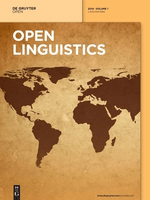
Open Linguistics
Transforming linguistic research into accessible knowledge.Open Linguistics is a premier open access journal dedicated to advancing the field of linguistics, published by DE GRUYTER POLAND SP Z O O. Since its inception in 2014, the journal has consistently provided a platform for innovative research and critical discourse in various subfields of linguistics. With an impressive Q1 ranking in the linguistics category as of 2023, Open Linguistics is recognized for its significant contributions, ranking #223 out of 1088 in Arts and Humanities, as well as achieving a commendable #260 out of 1167 in Social Sciences. The journal's open access policy ensures that research is freely accessible to both scholars and practitioners, fostering a collaborative and inclusive academic community. With a focus on original research, reviews, and theoretical papers, Open Linguistics is positioned as an essential resource for researchers, educators, and students seeking to deepen their understanding of language and its diverse applications in society.
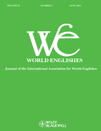
World Englishes
Charting the Impact of English in Diverse ContextsWorld Englishes, a leading peer-reviewed journal published by WILEY, serves as a vital platform for interdisciplinary research that explores the nuances of English language use around the globe. With an ISSN of 0883-2919 and an E-ISSN of 1467-971X, this journal has significantly impacted the fields of Anthropology, Linguistics, Sociology, and Political Science, boasting a Q1 ranking in each of these categories as of 2023. The journal’s focus extends from theoretical explorations to practical implications of English as a global lingua franca, making it indispensable for scholars, educators, and practitioners alike. Spanning over four decades of research from 1981 to 2024, World Englishes is dedicated to advancing our understanding of the sociolinguistic dynamics at play in various English-speaking communities. With robust Scopus rankings—including the 92nd percentile for Language and Linguistics—this journal not only underscores the significance of English globally but also fosters dialogue and engagement among diverse voices in the academic landscape. Embrace the opportunity to contribute to or engage with the cutting-edge discussions presented in this renowned publication.
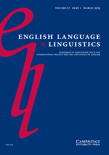
English Language & Linguistics
Illuminating the Pathways of Language UnderstandingEnglish Language & Linguistics is a prestigious journal published by Cambridge University Press, specializing in the dynamic fields of linguistics and language studies. With an impressive Q1 ranking in both Linguistics and Language categories for 2023 and a notable placement in the Scopus metrics, where it ranks #142 out of 1088 in Arts and Humanities, the journal is recognized for its high-quality research contributions and robust impact in the scholarly community. Since its inception in 1997, English Language & Linguistics has provided a forum for researchers to explore various aspects of language, facilitating the dissemination of innovative ideas and empirical studies. With no open access options currently available, the journal remains a valuable resource within the United Kingdom and beyond, fostering a deeper understanding of language intricacies and their broader societal implications. For practitioners and academicians alike, this journal is a critical resource for keeping abreast of the latest advancements in linguistics.
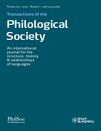
TRANSACTIONS OF THE PHILOLOGICAL SOCIETY
Elevating Academic Discourse in LinguisticsTRANSACTIONS OF THE PHILOLOGICAL SOCIETY, published by Wiley, is a prestigious journal focusing on the fields of linguistics and language studies. With a rich history that spans over 180 years, having been established in 1842, this journal continues to contribute significantly to the academic discourse on language and linguistics. It holds an impressive impact factor and ranks in the Q2 category for both Linguistics and Language in the 2023 category quartiles, underscoring its relevance and scholarly influence, as evidenced by its rankings in the Scopus database. Researchers, professionals, and students will find this journal invaluable for accessing high-quality research articles that illuminate various aspects of language and linguistics. While the journal does not currently offer open access, it remains a vital resource for anyone dedicated to advancing knowledge in these fields. Its address in the United Kingdom underscores its international reach and commitment to academic excellence.

Cadernos de Estudos Linguisticos
Unveiling the intricacies of language studies since 1978.Cadernos de Estudos Linguisticos, published by UNIV ESTADUAL CAMPINAS, INST ESTUDOS LINGUAGEM, stands as a pivotal platform in the field of linguistic studies since its inception in 1978. With its commitment to Open Access, this journal fosters the dissemination of cutting-edge research, ensuring that knowledge is accessible to a global audience. This also enhances collaboration among researchers, professionals, and students dedicated to exploring the nuances of language. The journal proudly carries the ISSN 0102-5767 and E-ISSN 2447-0686, attesting to its uninterrupted quality and relevance in linguistic scholarship. By addressing various facets of language studies, including syntax, semantics, and sociolinguistics, this esteemed journal is a vital resource for advancing understanding and innovation in the field.

Verba-Anuario Galego de Filoloxia
Exploring Linguistic Landscapes: Where Research Meets TraditionVerba-Anuario Galego de Filoloxia is a prominent academic journal published by UNIV SANTIAGO COMPOSTELA, dedicated to advancing the field of linguistics and language studies. Hailing from Spain, this journal provides a vital platform for researchers, educators, and students interested in Galician philology and its broader linguistic implications. Although it operates under traditional access models, the journal’s commitment to quality research is reflected in its categorization within Q3 in Linguistics and Language for 2023, showcasing its significant contributions to the field. Encompassing a convergence period from 2017 to 2024, Verba garners attention in both the Arts and Humanities and Social Sciences domains, with its Scopus rankings highlighting its moderate impact within these categories. By nurturing scholarly dialogue and disseminating innovative studies, Verba-Anuario Galego de Filoloxia plays a crucial role in promoting linguistic research, making it an essential resource for professionals and academic institutions striving to explore the complexities of language and philology.